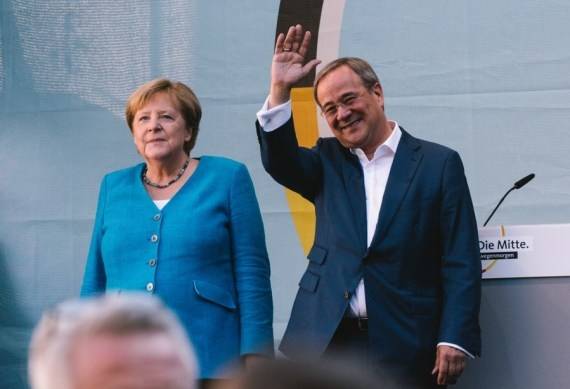The election is expected to yield a splintered parliament, which will force the winner to form a three-way coalition to secure a majority…reports Asian Lite News.
Germans went to the polls on Sunday in a national election too close to call, with the centre-left Social Democrats (SPD) mounting a strong challenge to retiring Chancellor Angela Merkel’s conservatives.
Merkel has been in power since 2005 but plans to step down after the election, making the vote an era-changing event to set the future course of Europe’s largest economy.
A fractured electorate means that after the election, leading parties will sound each other out before embarking on more formal coalition negotiations that could take months, leaving Merkel, 67, in a caretaker role.
“We all sense that this is a very important federal election,” Laschet told journalists after voting in his home constituency of Aachen. “It is a federal election that will decide the direction of Germany in coming years and therefore every vote counts.” Running against Laschet is Olaf Scholz of the SPD, the finance minister in Merkel’s right-left coalition who won all three televised debates between the leading candidates.
Scholz, 63, has seen his party’s lead over the conservatives squeezed to 1-3 points in final opinion polls, leaving Laschet with a chance of clinching a narrow victory.
“I hope that as many citizens as possible will go and vote and make a very strong result for the SPD possible and give me the mandate to become the next chancellor of the Federal Republic of Germany,” Scholz said after casting a ballot in his own constituency of Potsdam near Berlin.
The election commissioner said turnout stood at 36.5% at 2 p.m. local time (1200 GMT), down from 41.1% four years ago. The figure does not include postal votes, which are expected to exceed those cast in the 2017 election given the coronavirus pandemic.
The election is expected to yield a splintered parliament, which will force the winner to form a three-way coalition to secure a majority.
The most likely coalition scenarios see either the SPD or the conservative CDU/CSU bloc – whoever comes first – forming an alliance with the Greens and the liberal Free Democrats (FDP).
Scholz told supporters in Potsdam on Saturday that his preferred outcome was for the SPD and Greens to secure a majority to rule alone without a third partner.
Both the conservatives and the FDP reject a European “debt union” and want to ensure that joint European Union borrowing to finance the bloc’s coronavirus recovery package remains a one-off. The SPD has talked about taking steps towards a fiscal union.
The Greens favour a common European fiscal policy to support investment in the environment, research, infrastructure and education.
Scholz has not ruled out a leftist coalition with the Greens and the Left party, which wants to pull Germany out of NATO, a red line for the SPD.
ALSO READ-Blinken Departs For Qatar, Germany To Intensify Afghanistan Diplomacy
READ MORE-Germany offers $11.7mn for Afghan people support programme

